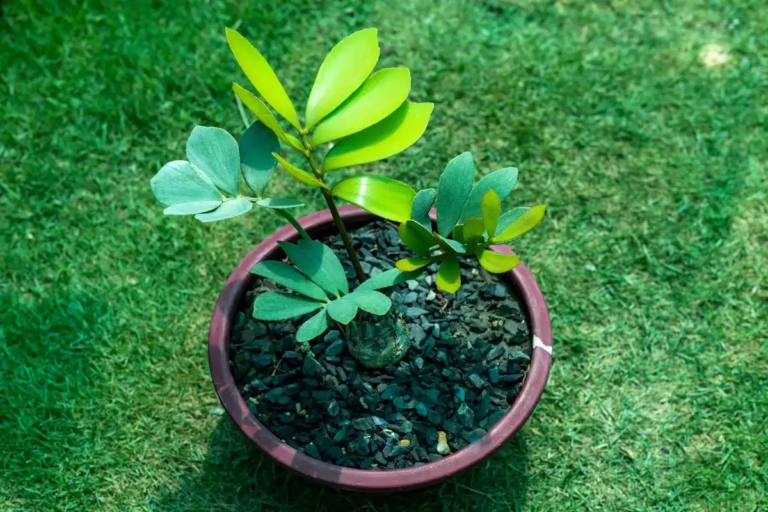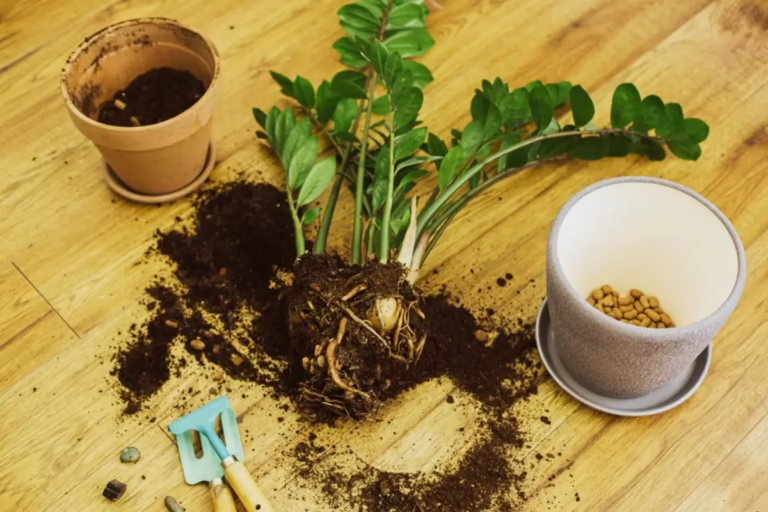Is ZZ Plant Toxic to Cats? Signs, Risks & Safe Alternatives
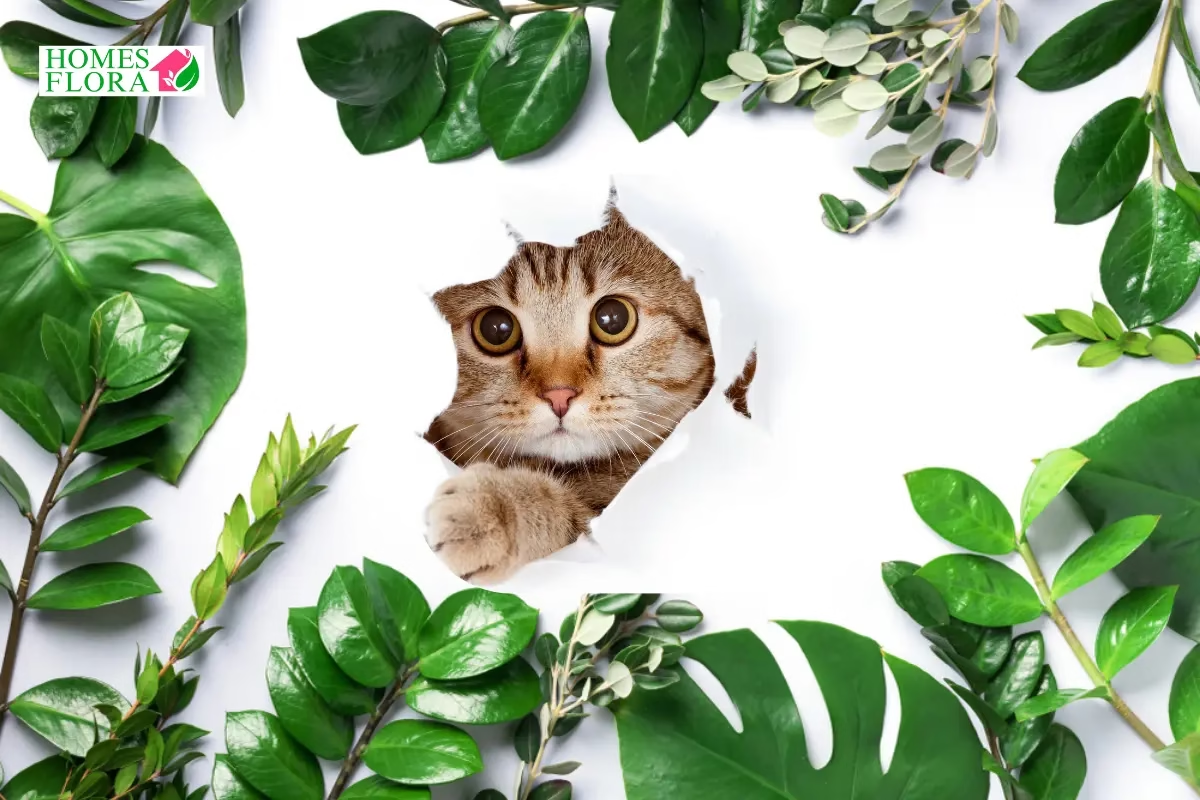
If you’ve found your cat nibbling on houseplants, you may be wondering, “Is ZZ plant toxic to cats?” The short answer is yes. The ZZ plant (Zamioculcas zamiifolia), while popular for its low-maintenance appeal, contains insoluble calcium oxalates that can irritate your cat’s mouth and digestive system. Common symptoms include drooling, vomiting, pawing at the mouth, and loss of appetite.
While ZZ plants can affect dogs and humans too, this article focuses specifically on their toxicity to cats. we’ll help you recognize the signs, explain what steps to take if your cat ingests a ZZ plant, and offer some pet-safe plant alternatives to keep your indoor garden both stylish and feline-friendly.
Quick Answer
According to ASPCA, the Zee Zee plant is mildly toxic to Cats and Dogs due to calcium oxalate crystals. Ingestion or contact can cause oral irritation, vomiting, or skin discomfort, so it’s best kept out of reach of cats, dogs, and children.
What Is A ZZ Plant?
Meet the ZZ plant, short for Zamioculcas zamiifolia. It is also known as Zanzibar Gem This popular houseplant is loved for its shiny, dark green leaves and simple care. It does well in low light and with little water, making it great for home or office. The origin of ZZ Plant is Africa and Since 1996, it has been sold worldwide thanks to Dutch nurseries. The ZZ plant is tough, cleans the air, and is admired by both new and experienced plant enthusiasts for its beauty and durability.
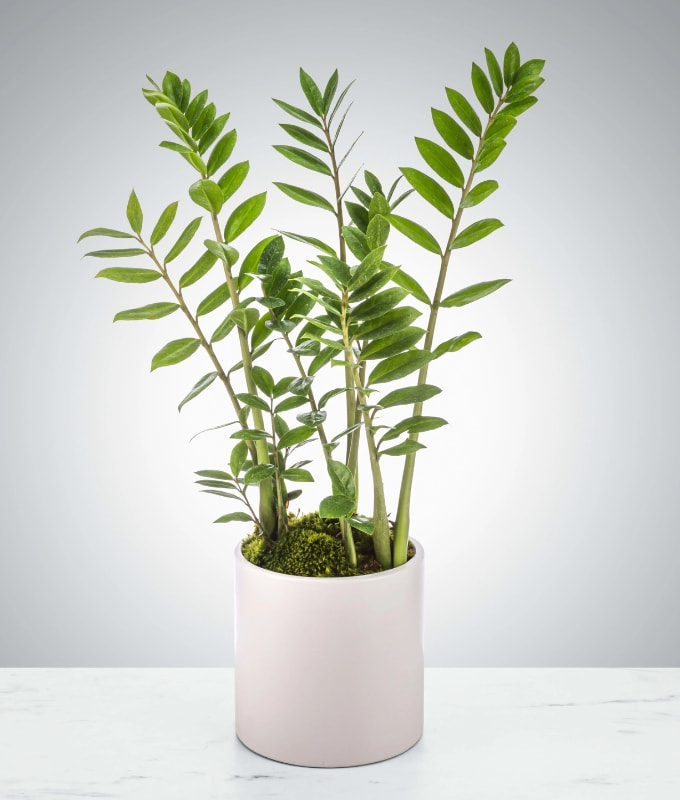
Is ZZ Plant Poisonous to cats?
Yes — according to the ASPCA (American Society for the Prevention of Cruelty to Animals), the ZZ plant (Zamioculcas zamiifolia) is toxic to cats. This common houseplant contains insoluble calcium oxalate crystals, which can cause oral irritation, excessive drooling, vomiting, difficulty swallowing, and in some cases, pawing at the mouth if ingested. While rarely life-threatening, even skin contact with the sap may lead to mild dermatitis or skin rashes in sensitive pets or humans.
What Makes the ZZ Plant Toxic to Cats?
Along with its many benefits—like being low-maintenance, air-purifying, and highly tolerant of low light—the zamioculcas zamiifolia poisonous to cats, including its striking Raven ZZ variety, contains calcium oxalate crystals. This naturally occurring substance makes the plant mildly toxic to pets and humans. If chewed or touched, it can lead to skin irritation, oral discomfort, or digestive upset. While it’s not usually dangerous in small amounts, it’s best to keep the ZZ plant out of reach of cats, dogs, and small children.
Are All Varieties of ZZ Plant Toxic to Cats?
Yes, all varieties of the Zamioculcas zamiifolia, including popular cultivars like the Raven ZZ, are considered toxic to cats. These plants contain insoluble calcium oxalate crystals, which can lead to symptoms such as oral irritation, excessive drooling, vomiting, and difficulty swallowing when ingested by felines.
The Raven ZZ plant, known for its striking dark purple-black foliage, has the same chemical composition as the classic green ZZ plant. Despite its different appearance, it poses the same risk to pets, especially curious cats who may nibble on the leaves or rub against the sap.
Pet Safety Tip: Regardless of variety—Raven, Classic, Dwarf, or Variegated—no ZZ plant is safe for cats. Always position them out of reach, or better yet, choose cat-friendly houseplants like the Calathea, Spider Plant, or Ponytail Palm.
What Happens If My Cat or Dog Chews a ZZ Plant?
If your cat comes into contact with a ZZ plant (Zamioculcas zamiifolia), it may develop symptoms of mild poisoning due to calcium oxalate crystals in the plant’s sap. These sharp crystals can irritate the soft tissues of the mouth, throat, and digestive tract.
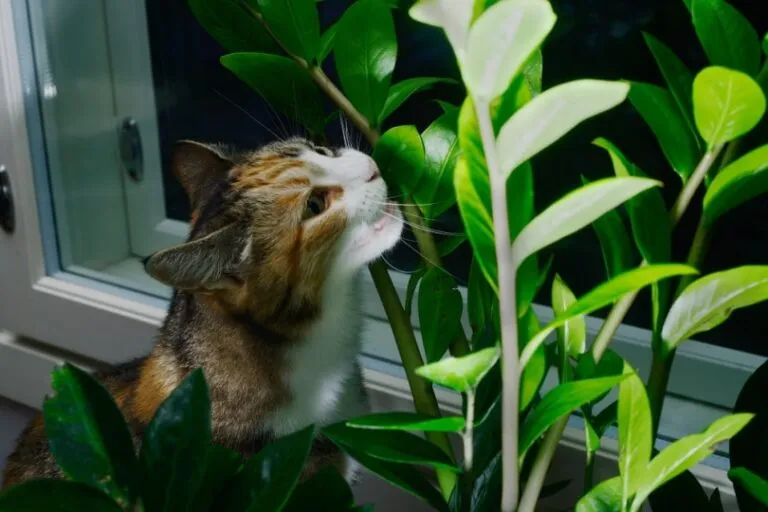
Common Signs of ZZ Plant Poisoning in Cats
These symptoms are usually non-lethal and short-lived, but still uncomfortable for your pet and concerning for you as the owner. It’s important to monitor your cat closely and ensure they don’t chew further on the plant.
Related Post: Are Carnations Toxic to Cats?
What to Do If Your Cat Eats a ZZ Plant
If your cat chews on or ingests part of a ZZ plant (Zamioculcas zamiifolia), stay calm but act quickly. ZZ plants contain insoluble calcium oxalate crystals, which can cause oral irritation, drooling, and gastrointestinal upset in felines. Follow these expert-recommended steps to respond safely and effectively:
Step 1: Gently Remove Plant Debris
Carefully open your cat’s mouth (if safe to do so) and remove any visible plant material. Use a damp, soft cloth to wipe the inside and outside of the mouth to reduce irritation from the toxic sap.
Step 2: Offer Fresh Water Immediately
Encourage your cat to drink clean, fresh water to help dilute the calcium oxalate crystals and flush the toxins. Staying hydrated can reduce the risk of esophageal inflammation or vomiting.
Step 3: Call Your Veterinarian Promptly
Contact your veterinary clinic or pet poison helpline right away — especially if your cat exhibits symptoms like persistent vomiting, pawing at the mouth, or swelling. Describe the amount eaten and observed symptoms.
Step 4: Monitor for Symptoms
Watch your pet for common signs of ZZ plant toxicity in cats, including:
Provide a calm, quiet space and keep water available while your cat recovers.
Step 5: Avoid Unapproved Home Remedies
Do not administer human medications, activated charcoal, or online “DIY cures” without veterinary supervision. Some treatments may cause more harm than good.
Related Post: Is Prayer Plant Toxic To Cats?
Expert Insight: In mild cases, offering a spoonful of plain yogurt or goat milk may help soothe the throat — but only with your vet’s approval.
What happens If a Large Amount of ZZ Plant Is Ingested?
While ZZ plants (Zamioculcas zamiifolia) are only mildly toxic, consuming them in large quantities can lead to more serious health issues in cats, dogs, or even young children.
Key Exposure Risks
Potential Complications (If Ignored)
- Dehydration: Continuous vomiting or drooling can lead to fluid loss and dehydration, especially dangerous in small or older cats.
- Mucosal Irritation: Extended exposure may inflame the mouth lining, leading to ulcers or refusal to eat.
- Behavioral Changes: Your cat may hide, become lethargic, or stop grooming — all signs that need immediate veterinary evaluation.
Expert Guidance: If your cat, dog, or child has consumed a significant amount of the ZZ plant, or is showing signs of toxic plant exposure, contact your veterinarian or poison control center immediately. Do not delay treatment, especially if vomiting or oral swelling occurs.nt is toxic, it’s still loved for its beauty and easy care. Simple precautions can keep everyone safe.
Related Post for Pet Owners: Reasons Why Are Dogs Better Than Cats | Pets Combat
Safe Houseplants for Homes with Cats
Worried about houseplants that may harm your feline friend? These indoor plants are veterinarian-approved, cat-safe, and free from toxic compounds like insoluble calcium oxalates — making them ideal for pet-friendly living spaces.
Spider Plant (Chlorophytum comosum)
A popular choice for pet owners, the Spider Plant is entirely harmless to cats and even helps clean indoor air. Its cascading striped leaves make it perfect for hanging planters and high shelves.
Boston Fern (Nephrolepis exaltata)
Loved for its lush, feathery foliage, the Boston Fern is listed by the ASPCA as non-hazardous to felines. It thrives in humidity and works well in bathrooms or sunrooms.
Areca Palm (Dypsis lutescens)
Also called the Golden Cane Palm, this tropical houseplant is feline-friendly and makes an elegant floor plant. It acts as a natural humidifier and prefers bright, filtered light.
African Violet (Saintpaulia)
These beautiful flowering plants bring vibrant blooms year-round and are confirmed as safe around domestic cats. They grow well in indirect sunlight and are compact enough for any windowsill.
Peperomia (Peperomia obtusifolia)
Peperomias are compact, decorative foliage plants that pose no poisoning risk to cats. They come in various leaf shapes and textures, adding visual interest to your indoor garden.
Ponytail Palm (Beaucarnea recurvata)
Despite its dramatic appearance, the Ponytail Palm is cat-compatible and easy to care for. It stores water in its bulbous base and is great for low-maintenance households.
Prayer Plant (Maranta leuconeura)
Known for its fascinating leaf movement at night, the Prayer Plant is cat-safe, tolerates low light, and adds color and texture to any pet-conscious home.
Calathea (orbifolia & lancifolia)
With their bold patterns and lush appearance, Calatheas are considered non-irritating to pets. They’re ideal for rooms with moderate humidity and indirect light, bringing both style and safety.
Expert Tip: When shopping for indoor plants, look for labels such as “pet-friendly,” “cat-safe,” “non-irritant,” or check against the ASPCA toxic plant list. Not all beautiful plants are safe — but these ones are.
Conclusion
If your pet has eaten a ZZ plant, acting quickly is essential. ZZ plants are toxic to pets, so remove any plant pieces from your pet’s mouth. Watch for symptoms like vomiting, diarrhoea, or tiredness. Call your vet or a pet poison helpline right away for advice. Taking quick action can help keep your pet safe and healthy. Remember, we’re here to support you in caring for your furry friend. If You are Plant lover and want to explore more plants here is our guide on “Is Money Tree Toxic To Cats” and “Is Peace lily Toxic To Pets” for your more information and clear confusion about these plants.


